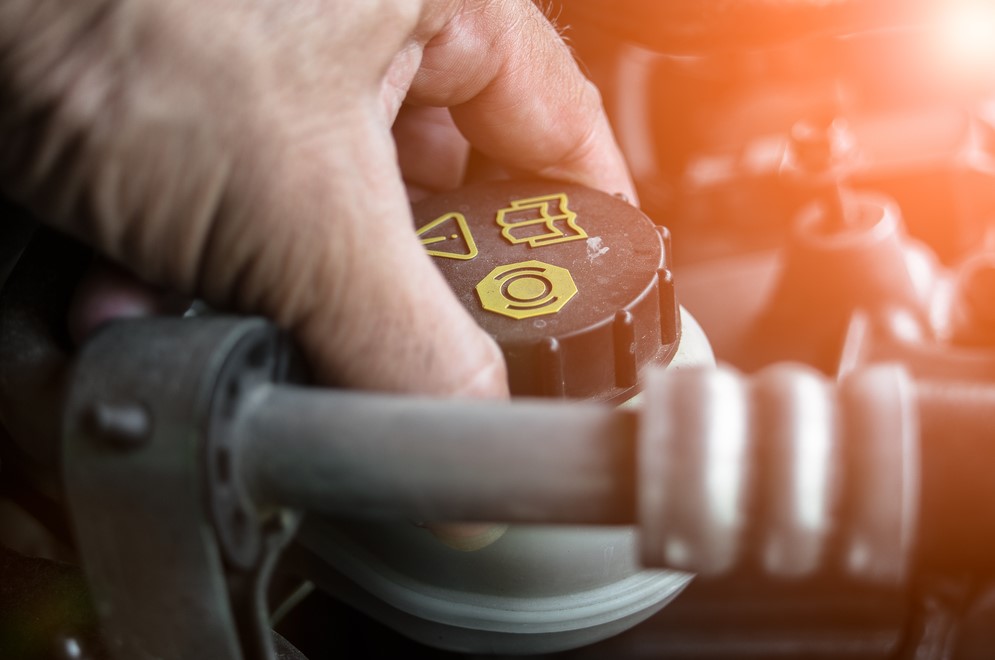Here’s What You Need to Know About Brake Fluid

Your car’s braking system is the only thing between you and whatever you’re approaching. And without the proper brake fluid in it, your car will not stop. This is exactly why routine brake maintenance is so important to the safety of not only you and any passengers in your car, but also to the other drivers and pedestrians you share the road with.
At Christian Brothers Automotive, we believe that all car owners should understand what exactly brake fluid is, how it works, why it’s so important, and what to do when it comes time to replace it. If you think you may be in need of brake service, click here to learn more.
What Is Brake Fluid?
Brake fluid is a type of hydraulic fluid used in hydraulic braking systems to transfer force into pressure, bringing the vehicle to a complete stop when the brakes are pushed in. Similar to your engine, modern braking systems require routine flushes and replacements of the brake fluid at designated intervals.
Brake fluid is one of the most critical fluids in your car for a few main reasons:
Brake Fluid Helps Your Car Stop
The relationship between brake fluid, hydraulic braking system, and vehicle motion is a great real-life example of Pascal’s law. This principle states that when a fluid experiences any type of pressure change in an enclosed space, the pressure is transmitted equally in all directions.
When you press your foot on your brake pedal as you approach a red light, a rod forces a piston into the cylinder, creating new pressure throughout the entire hydraulic system. This newly added pressure is distributed throughout the system by forcing brake fluid throughout the brake lines into the caliper pistons. The pistons then apply the force to your brake pads, applying force to the spinning tire rotors and slowing down the entire vehicle.
Brake Fluid Prevents Rust & Corrosion
The majority of brake fluids are hygroscopic meaning that its great at absorbing moisture. This means that not only does it lubricate all the moving parts and components of your car’s braking system, but the fluid also soaks up any moisture in your system to prevent corrosion and rust.
How does water get there in the first place? Typically, water can enter your system via leaks in your brake lines or broken seals in the master cylinder or caliper.
What Are the Types of Brake Fluid?
Brake fluid comes in a few different forms: DOT 3, DOT 4, DOT 5, and DOT 5.1. DOT 3, DOT 4 and DOT 5.1 are glycol-based fluids that absorb water and continue to be the most commonly used in modern vehicles. DOT 5 is a silicone-based fluid that does not absorb water and is typically used in classic cars and vehicles that need non-petroleum-based brake fluids.
Typically, additives are blended into the brake fluid, usually designed to prevent corrosion, rust, or general wear, some additives act as acid neutralizers or pH balancers.
What Type of Brake Fluid Does My Car Need?
The best way to figure out what type of brake fluid you need for your car is by referring to the car’s owner manual provided by the manufacturer or the master cylinder reservoir cap.
When Do I Need to Change My Brake Fluid?
Along with the type of brake fluid, your car’s owner manual will indicate how often you need your brake fluid flushed and replaced. In general, brake fluids flushes are recommended every 30,000 miles or two years.
At the end of the day, the frequency of your brake fluid changes depends on your driving habits and braking patterns. Things like constant stop-and-go traffic, sudden braking, and increased mileage can all contribute to needing brake fluid service sooner than later.
How Do I Tell if My Brake Fluid Needs to Be Changed?
Be on the lookout for these signs you need to have your brake fluid replaced:
ABS Light Illuminates
When your ABS dashboard light lights up, you should take this as a sign to check your brake fluid and consider a replacement. If things seem fine, there are a few other reasons why your ABS light may be on.
Changes in Brake Pedal
If your brake pedal isn’t responding the way it used to, it’s most likely due to your brake fluid being low or in need of a replacement. Your brake pedals may feel soft, loose, bouncy, or spongy when stepped on.
Strong Burning Smell & Loud Sounds
Any strong burning smells coming from your car should be a sign that something is wrong. While the smell may simply be from a large downhill braking battle, it can also mean that all of your fluid is burnt and needs to be replaced.
When the smell is noticed, let your car cool down and inspect your fluid. If a loud screeching, squealing, or squeaking sound is coming from your brakes, it’s most certainly time to consider having your fluid replaced and brakes serviced.
Ineffective Braking
Your brakes should be quick and responsive. If this is far from the case, or you’ve noticed a sudden change in the performance of your brakes, your vehicle’s brakes need to be serviced. The sudden decrease in quality can be caused by low or dirty brake fluid, warped rotors, and other types of wear and tear on your system’s components including worn brake pads.
How Do I Check My Brake Fluid?
Checking your brake fluid is very simple and can be completed virtually anywhere. It’s important to remember that brake fluid is toxic and should be handled with care.
Follow these simple steps to check your car’s brake fluid:
- Locate your car’s brake master cylinder. This is the brake fluid reservoir and is usually a simple plastic container on the driver’s side of the vehicle, up against the firewall.
- Check the fluid level by either inspecting the side of the reservoir and making note of the fluid level compared to the fill line. If your vehicle is older, you will need to remove the metal cap, paying special attention to not letting any type of debris fall in. Once opened, make note of the line marked inside the reservoir.
- If the fluid level is low, you can add brake fluid to the full line to provide some temporary relief and save your system from major damage.
- Replace the cap or top and close your hood.
It’s important to note that any type of drop in your vehicle's brake fluid usually indicates that your brake system requires maintenance or there may be a leak in your line. Either way, it’s important to have your car and brakes inspected as soon as possible.
Visit a Local Auto Shop for Brake Fluid Service
If you’re looking for the easiest way to replace your car’s brake fluid, take your vehicle to a local auto mechanic shop. Not only is this much more convenient than doing it on your own, but it also guarantees that your service will be completed correctly.
At Christian Brothers Automotive, we specialize in delivering automotive services that keep you and our communities safe on the road. If you’re looking for any type of brake or brake fluid service, considering dropping into one of our shops for both routine and one-time service.
Looking for “brake fluid services near you?” You’ve come to the right place – locate your nearest CBA auto shop and schedule a free courtesy inspection today!


[1].jpg)
Sunwash-Tech-with-Customer.jpg)

